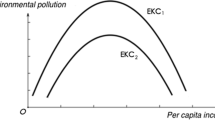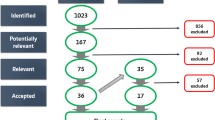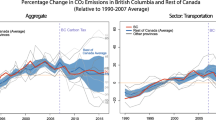Abstract
Although Chinese government has implemented a series of laws, regulations, and policies to deal with air pollutants, air pollution is still one of the biggest concerns in China. Most of the cities in China suffered from extremely high air pollution levels and cannot meet the national air quality standards. In this study, we attempt to measure individuals’ average marginal willingness to pay (MWTP) in Beijing with the hedonic price model. We combine an extensive housing transaction dataset with emission data of six air pollutants from 2013 to 2016 in Beijing, China. When estimating the hedonic price function, we apply both ordinary least squares (OLS) and panel model with various fixed effects to better control for unobservables. The empirical results reveal that the concentrations of CO, NO2, PM2.5, and PM10 are significantly negatively correlated with housing prices. However, we found an insignificant relationship with the concentration of SO2 and the concentration of O3 appears to positively increase the housing values. Policy implications based on these results were also discussed.







Similar content being viewed by others
Notes
See the “2015 China Environmental Status Bulletin” available at http://www.mee.gov.cn/hjzl/zghjzkgb/lnzghjzkgb/201606/P020160602333160471955.pdf (in Chinese).
References
Abbott J, Klaiber HA (2011) An embarrassment of riches: confronting omitted variable bias and multiscale capitalization in hedonic price models. Rev Econ Stat 93:1331–1342
Bajari P, Fruehwirth JC, Kim KI, Timmins C (2012) A rational expectations approach to hedonic price regressions with time-varying unobserved product attributes: the price of pollution. Am Econ Rev 102:1898–1926
Carriazo F, Ready R, Shortle J (2013) Using stochastic frontier models to mitigate omitted variable bias in hedonic pricing models: a case study for air quality in Bogotá, Colombia. Ecol Econ 91:80–88
Chen D, Chen S (2017) Particulate air pollution and real estate valuation: evidence from 286 Chinese prefecture-level cities over 2004-2013. Energy Policy 109:884–897
Freeman R, Liang W, Song R, Timmins C (2019) Willingness to pay for clean air in China. J Environ Econ Manag 94:188–216
Haninger K, Ma L, Timmins C (2017) The value of brownfield remediation. J Assoc Environ Resourc Econ 4:197–241
Harrison D, Rubinfeld D (1978) Hedonic housing prices and the demand for clean air. J Environ Econ Manag 5:81–102
Hitaj C, Lynch L, McConnell KE, Tra CI (2018) The value of ozone air quality improvements to renters: evidence from apartment building transactions in Los Angeles County. Ecol Econ 146:706–721
Kim CW, Phipps TT, Anselin L (2003) Measuring the benefits of air quality improvement: a spatial hedonic approach. J Environ Econ Manag 45:24–39
Kuminoff NV, Pope JC (2014) Do ‘capitalization effects’ for public goods reveal the public’s willingness to pay? Int Econ Rev 55:1227–1250
Lu X, Yao T, Fung JCH, Lin C (2016) Estimation of health and economic costs of air pollution over the Pearl River Delta region in China. Sci Total Environ 566-567:134–143
Mei Y, Zhao X, Lin L, Gao L (2018) Capitalization of urban green vegetation in a housing market with poor environmental quality: evidence from Beijing. J Urban Plan Dev 144:05018011
Meng K, Xu X, Cheng X, Xu X, Qu X, Zhu W, Ma C, Yang Y, Zhao Y (2018) Spatio-temporal variations in SO2 and NO2 emissions caused by heating over the Beijing-Tianjin-Hebei Region constrained by an adaptive nudging method with OMI data. Sci Total Environ 642:543–552
Pope CA, Burnett RT, Thun MJ, Calle EE, Krewski D, Ito K, Thurston GD (2002) Lung cancer, cardiopulmonary mortality, and long-term exposure to fine particulate air pollution. J Am Med Assoc 287:1132–1141
Rosen MS (1974) Hedonic prices and implicit markets: estimating demand and supply functions for differentiated products. J Polit Econ 82:34–55
Smith VK, Huang J (1995) Can markets value air quality? a meta-analysis of hedonic property value models. J Polit Econ 103:209–227
Tang C, Heintzelman MD, Holsen TM (2018) Mercury pollution, information, and property values. J Environ Econ Manag 92:418–431
Wang Y, Zhang Y (2009) Air quality assessment by contingent valuation in Ji’nan, China. J Environ Manag 90:1022–1029
Zabel JE, Kiel KA (2000) Estimating the demand for air quality in four U.S. cities. Land Econ 76:174–194
Zhang X, Zhang X, Chen X (2017) Valuing air quality using happiness data: the case of China. Ecol Econ 137:29–36
Zheng S, Cao J, Kahn ME, Sun C (2014) Real estate valuation and cross-boundary air pollution externalities: evidence from Chinese cities. J Real Estate Financ Econ 48:398–414
Author information
Authors and Affiliations
Corresponding author
Additional information
Responsible editor: Eyup Dogan
Publisher’s note
Springer Nature remains neutral with regard to jurisdictional claims in published maps and institutional affiliations.
Rights and permissions
About this article
Cite this article
Mei, Y., Gao, L., Zhang, J. et al. Valuing urban air quality: a hedonic price analysis in Beijing, China. Environ Sci Pollut Res 27, 1373–1385 (2020). https://doi.org/10.1007/s11356-019-06874-5
Received:
Accepted:
Published:
Issue Date:
DOI: https://doi.org/10.1007/s11356-019-06874-5




